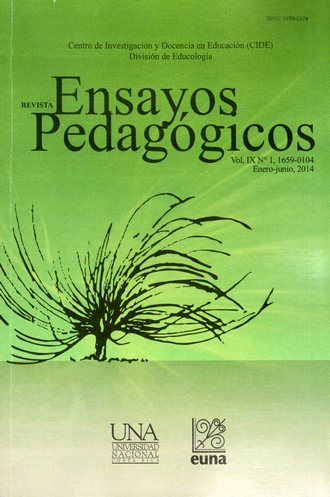The Interaction with English Speakers and their Influence on Communicative Competence
DOI:
https://doi.org/10.15359/rep.9-1.5Keywords:
interaction, volunteer, English, competence, innovationAbstract
English has become the language of the knowledge society in which modern human beings live. To acquire it, every day thousands enroll and begin the dream of being able to communicate using this language. However, truancy is the worst enemy and a number quite similar renounce and leave the classrooms, frustrated by the feeling of not being able to reach the goal. What are the factors that lead many students to make this decision? Whatever the reasons, learning English as a foreign language is something that very few complete. The following scientific article aimed to identify the areas of the communicative competence that students improve by weekly interacting with English speakers. To achieve the goal, a group of twelve students were selected. They were studying English as a foreign language in the Universidad Técnica Nacional in Costa Rica. The results obtained were very interesting because the aspect of the communicative competence that they find the most difficult is the one being positively affected by these conversational sessions. As a conclusion, the collaboration of an English speaking volunteer in the classroom is an easy, fun, dynamic, innovative, different and very easy issue.
References
Álvarez-Gayou, J. (2005). Cómo hacer investigación cualitativa: Fundamentos y metodología. México: Paidós.
Ballestero, C. y Batista, J. (2007). Evaluación de la enseñanza del inglés con fines específicos en educación superior. Revista Omnia, 13(001), 105-129. Recuperado de http://redalyc.uaemex.mx/redalyc/pdf/737/73713106.pdf
Barrantes, R. (2002). Investigación: Un Camino Al Conocimiento. Un Enfoque Cuantitativo Y Cualitativo. EUNED. San José: Costa Rica.
Blázquez, A. (2010). Metodología de la enseñanza del inglés como segunda lengua. Innovación y experiencias educativas. Recuperado el 21 de marzo de http://www.csi-csif.es/andalucia/modules/mod_ense/revista/pdf/Numero_30/ANTONIO_BLAZQUEZ_ORTIGOSA_02.pdf
Brown, H. D. (2000). Teaching by Principles: an interactive approach to language pedagogy. San Francisco, California: Longman
Callejo, J. (2002). Observación, entrevista y grupo de discusión: El silencio de tres prácticas de investigación. RedALyC, 76(5), 409-422. Recuperado de http://www.ecominga.uqam.ca/ECOMINGA_2011/PDF/BIBLIOGRAPHIE/GUIDE_LECTURE_2/7/7.Callejo_y_Gallego.pdf
Cassany, D., Luna, M. y Sanz, G. (2002). Enseñar Lengua (Reimpresión 8a). Barcelona, España: Graó.
CINDE, (2011). Panorama general de la educación en Costa Rica. Recuperado el domingo 29 de abril de http://www.cinde.org/attachments/079_Educacion%20en%20Costa%20Rica.pdf
Córdoba, P., Coto, R. y Ramírez, M. (2005). La enseñanza del inglés en Costa Rica y la destreza auditiva en el aula desde una perspectiva histórica. Revista Electrónica Actualidades Investigativas en Educación 5(2). Recuperado de http://revista.inie.ucr.ac.cr/uploads/tx_magazine/ingles_01.pdf
Crystal, D. (2003). English as a global language. Cambridge University Press. Recuperado el lunes 13 de febrero 2012 de http://www.sprachshop.com/sixcms/media.php/811/English_as_a_grobal_lang_sample_ch.pdf
Dziubalska, K y Przedlacka J. (2008). English pronunciation models: A changing scene. Bern, Switzerland: Peter Lang AG, International Academic Publishers.
Flick, U. (2006). Introducción a la investigación cualitativa. (2da ed.). Madrid, España: Ediciones Morata.
Galeano, M. (2004). Diseños de proyectos en la investigación cualitativa. Fondo Editorial Universidad EAFIT. Medellín: Colombia.
Graddol, D. (2000). The future of English? The English Company (UK) Ltd. Recuperado el lunes 13 de febrero 2012 de http://www.britishcouncil.org/learning-elt-future.pdf
Gutiérrez, N. (2003). Propuesta de innovación de intervención pedagógica (Tesis de Maestría). Recuperado el jueves 26 de abril de http://biblioteca.ajusco.upn.mx/pdf/20864.pdf
Marelli, L. (2008). Una experiencia intercultural de aprendizajes compartidos. UNAM. Recuperado el viernes 23 de marzo de http://www.unam.edu.ar/2008/educacion/trabajos/Eje%203/245%20-marelli.pdf
Pak, J. (2012). Is English or Mandarin the language of the future? News Magazine. Recuperado el viernes 24 de febrero 2012 de http://www.bbc.co.uk/news/magazine-17105569
Salinas, J. (2004). Innovación docente y uso de las TIC en la enseñanza universitaria RU&SC. Revista de Universidad y Sociedad del Conocimiento, 1(1), 1-16. Recuperado de http://redalyc.uaemex.mx/redalyc/pdf/780/78011256001.pdf
Singleton, K. (1999). Using Volunteers in your ESL Classroom: Suggestions for Newer Teachers. The Internet TESL Journal, 5(3). Recuperado el miércoles 21 de marzo de http://iteslj.org/Articles/Singleton-Volunteers.html
Soler, E. (2002). Bases lingüísticas y metodológicas para la enseñanza de la lengua inglesa. Francia: Universitas.
Downloads
Published
How to Cite
Issue
Section
License
Ensayos Pedagógicos is subscribed to the Attribution-NonCommertial-NoDerivatives 4.0 International Creative Commons Licence, which allows both authors and readers to freely download, store, copy, and distribute the final approved publisehd version of the manuscript (post-print) as long as this is done without commercial purposes, no derivative works are generated, and the source and author are mentioned. As well, Ensayos Pedagógicos declares that authors will remain the rightful owners of the copyrights of their work in perpetuity.







